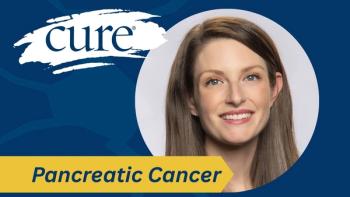
- Spring 2018
- Volume 1
- Issue 1
Team Player
After losing her husband and sister to cancer, journalist Katie Couric became an advocate for collaborative efforts to improve prevention and treatment.
Fresh from her appearances as co-host of the opening ceremonies for the Winter Olympics, television journalist Katie Couric took some time to share insights with CURE® about her efforts over two decades to improve the prevention and treatment of gastrointestinal (GI) and other cancers. Here, the former co-anchor of the “Today” show on NBC discusses her lifesaving contribu­tions to the oncology community, as well as her latest documentary and podcast projects.
CURE®: You lost your husband to colorectal cancer and your sister to pancreatic cancer. What motivated you to make a difference in the cancer community?
Katie Couric: My personal journey with cancer began in 1997, when my seemingly healthy husband, Jay, who was 41, was diagnosed with colon cancer that had spread to his liver. After battling the disease with grace and grit for nine months, he lost his fight. Our daughters were 6 and 2. When I could pick myself up, I knew I had to do something. I reached out to the Entertainment Industry Foundation, the charitable arm of the film and TV businesses, and together we established the National Colorectal Cancer Research Alliance to raise funds for research and aware­ness about the value of screening. We also raised the seed capital for the Jay Monahan Center for Gastrointestinal Health, at New York-Presbyterian Hospital/Weill Cornell Medical Center in New York City, to provide compassionate and comprehensive care for patients with gastrointestinal cancers and their families.
Almost four years after we lost Jay, cancer rocked my family again when pancreatic cancer took my sister Emily’s life. She was a rising star in Virginia politics and had just passed legislation mandating insurance coverage of colorectal cancer screening for people over 50, making Virginia the first state in the nation to enact such a law.
What I learned during Jay’s and Emily’s illnesses was that there were no easy ways for the dedicated researchers at different academic medical centers to work together. After
initially focusing my advocacy efforts on colon cancer, in 2007, I teamed up with eight wonderful women to establish Stand Up To Cancer (SU2C), with the idea of supporting collaborative research on all cancer types that crossed dis­ciplines and broke down institutional silos.
You started your advocacy efforts in 2000, when you underwent a televised colonoscopy. Why were you willing to give up your privacy to do this?
After Jay’s death, the importance of screening — as a tool for preventing cancer or catching it early — came into sharp focus for me. I was determined to spread the word and had a built-in bully pulpit in my role on the “Today” show. Televising my own colonoscopy would help demys­tify the procedure; it felt like a natural way to report the story. I never had any big concerns about privacy. I received hundreds and hundreds of letters and emails from people who said it encouraged them to have a colonoscopy, and many believe it saved their lives, which is incredibly gratify­ing. To this day, strangers come up to me on the street and tell me stories about themselves or family members, credit­ing that on-air colonoscopy with saving a life.
While awareness efforts have contributed to lower incidence and mortality rates from colorectal cancer, one in three Americans age 50 or over has not had the recommended testing. So, if you are 50 or over, please get screened. If you are under 50, tell someone you love who needs to be screened to get screened. And no matter what age you are, please know the symptoms. There has been alarming news that the rates of colon and rectal cancer are rising sharply among young and middle-aged Americans, and we don’t yet know why.
The bottom line: There is still a lot of work to be done in the fight against our second-leading cancer killer.
Tell us more about the Jay Monahan Center.
When Jay was diagnosed with colon cancer, we spent untold time and energy tracking down and evaluating treatment options, making what was already a nightmarish situation more difficult. If only there had been a place we could go to find the latest information on treatments, sup­port, clinical trials and more. After Jay’s death, I wanted to make such a place available to future patients with gastro­intestinal cancers.
The Jay Monahan Center for Gastrointestinal Health provides seamless, comprehensive and compassionate care in the prevention and treatment of all gastrointestinal cancers. Its staff treats the patient, not just the disease, and helps entire families cope with the myriad issues that arise when someone receives a diagnosis. The burden of navi­gating options and coordinating care is taken off patients and their families.
One element of the work is multidisciplinary care for patients and their families who have been diagnosed or are at risk of gastrointestinal hereditary cancer syndromes that affect the colon, pancreas, gastric system or small bowel. Gastroenterologists, oncologists, surgeons, genetic coun­selors, social workers and nutritionists provide assessment, genetic testing, education, lifelong screening, surveillance and treatment. Patients and their families are enrolled in a clinical database and followed yearly to ensure compliance with screening. Serum and tissue markers are biobanked for treatment and research, and individualized treatment plans are devised based on genetic testing results and pre­cision medicine analysis.
What is the back story on how Stand Up To Cancer was launched, and what has the group achieved so far?
In 2007, nine very Type A women — whose lives had been profoundly affected by cancer — got together. The pow­erhouse group included former Paramount Pictures chief Sherry Lansing; legendary movie producer Laura Ziskin; Lisa Paulsen and Kathleen Lobb of the Entertainment Industry Foundation; marketing whizzes Rusty Robertson and Sue Schwartz; Ellen Ziffren, whose work spanned both the entertainment and nonprofit worlds; and TV producer Noreen Fraser. Our idea was to use the resourc­es of the entertainment community to engage both the public and big donors in supporting a new approach to cancer research.
We asked experts what would help get new treatments to patients more quickly, and the answer was teamwork: bringing together the most innovative scientists from across different disciplines and institutions, with sufficient funding and rigorous oversight.
We are fortunate to have a Nobel laureate, Dr. Phillip Sharp, as chair of our scientific advisory committee, and the American Association for Cancer Research as our scientific partner. Cancer took the lives of two of our co-founders: Laura Ziskin and Noreen Fraser.
Pamela Oas Williams, who had been Laura’s producing part­ner for many years and worked on SU2C from the get-go, joined our leadership team, as did Sung Poblete, Ph.D., RN, who came on as SU2C’s president and CEO seven years ago.
In our first decade, SU2C has launched 22 “dream teams” of scientists and funded 46 innovative grants supporting 1,200 researchers at over 140 institutions. Our research has contributed to FDA approval of five new cancer treatments for breast, ovarian, pediatric and pancreatic cancers. SU2C researchers discovered that some metastatic prostate can­cers can be treated with targeted therapies developed for other cancer types. And SU2C was an early backer of the latest wave of immunotherapy research, leading to drugs that generate lasting benefits for some with cancers includ­ing melanoma and lung.
We’ve also pioneered additional collaborative approaches:
Our Convergence Initiative pairs cancer research­ers with investigators from diverse disciplines. On our newest teams, experts in life sciences, mathematics and engineering will work col­laboratively with Microsoft Research experts in artificial intelligence and machine learning to understand the interaction between cancer and the immune system, which could lead to the development of new treatments for specific groups of patients.
SU2C Catalyst uses fund­ing and materials from phar­maceutical, biotechnology, diagnostic and medical device companies to rapidly explore new uses of potential com­pounds for cancer prevention, detection and treatment through clinical trials.
We’re making inroads in the emerging field of “intercep­tion,” which focuses on interrupting cancer development in its early stages, which can block disease progression.
We’ll mark a major milestone on May 28, when SU2C will celebrate its 10th anniversary.
For people with GI cancers and their families, what’s important to know or do?
Know that the survival rate for colorectal has been increas­ing every year. There are over one million colorectal cancer survivors in the United States, so there is hope. It’s easy to feel overwhelmed by the diagnosis, but there are resources that offer expert guidance. Talk to doctors and nurses to learn about support groups and to see if a clinical trial is right for you.
Articles in this issue
over 7 years ago
A Time for Actionover 7 years ago
The Center of Attentionover 7 years ago
Hold the Phoneover 7 years ago
Straight to the Heartover 7 years ago
Unbreakable Bonds



